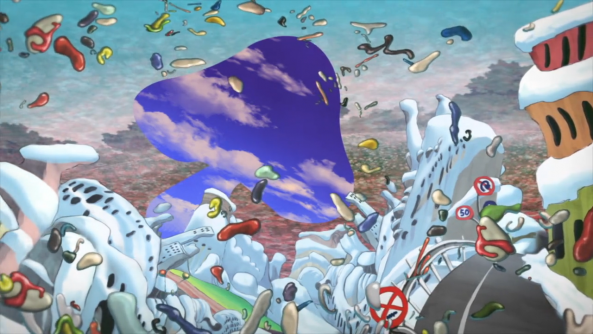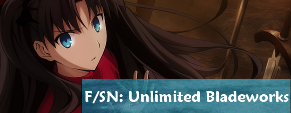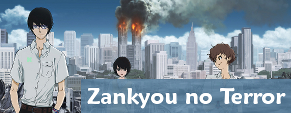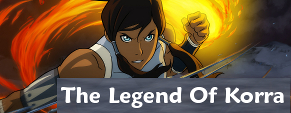Flip Flappers – 13 Review

Ah, of course, blood… How else are you supposed to make anything look (supposedly) badass?
Flip Flappers 13: Turns out Cocona’s grandma is a robot, so nobody’s surprised to find out that her mother is some weird science-experiment-monster. But things are a bit more complicated than you’d think and her mother is a good guy but during the escape, she turned into a bad guy. Go figure what Cocona is supposed to do about that.
As all bad mothers, Mimi wants to smother her daughter Cocona in comfort. Naturally, Cocona rejects this since she had just accepted Papika’s proposal (which teaches you something about where persistence gets you in the dating-world).
What follows is a lot of fighting. But who can possibly know what will happen when the good guys battle the villain during the last episode of a series…
Review:

Wait, since when has this been a concern of the story…? Cocona’s purity was never in doubt. It’s her doubts and fears that are important. Nobody (except evilMimi) is looking at Cocona as a “bad girl” that needs to be punished!
Probably one of the series biggest flaws is its attempt to make a case of necessity for most of its more intricate elements. It’s clear that someone put a lot of thought and care into the creative decisions that have constructed a lot of the show’s appeal. But it’s also equally clear with its ending that the show doesn’t reward those viewers who care about its depths. My experience with the series wasn’t certainly founded on enjoyment but I also didn’t hate the series. It was just interesting to me and writing these reviews, I always tried to find the ultimate message of the series in its depths (ie. all the weird bits and pieces). But having seen the ending, I think this series’ story is more present on the surface than the convoluted references and messages that are obscured by metaphor and symbolism in the show.
Piecing together what the show ultimately wants to say and aspires to be, it isn’t the obscure and hidden stuff that made it all click into place for me personally but the few things the show consistently did on the surface. And on its surface, Flip Flappers is nothing but a magical-girl-show. One of the central elements of the show and what it’s named after is Flip-Flapping and essentially it’s another name for the transformation the girls undergo in this series. Even Mimi is ‘Flip-Flapping’ in the end. And fitting the magical-girl-genre Cocona is a naïve, innocent girl whose transformation happens figuratively and metaphorically. The helpless, clueless girl gets magical-girl-powers to figure out her place in life.
Before I talk further about Flip-Flappers’ take on the magical-girl-genre, there’s, of course, a certain question that can’t be ignored: But what about Pure Illusion? A lot of creativity went into designing that setting and what it represents, of course. And a ton of people are trying to interpret the finer points the series is making through the Pure Illusion setting. But I don’t believe that Pure Illusion enhances the show’s Magical-Girl-aspects of the show. In fact, one of the show’s biggest problems is that the show has shown itself incapable of connecting its stranger aspects with the more typical magical-girl-elements.
The series as a whole has a hard time deciding what the story of the show is supposed to be. Is it about Pure Illusion? Is it about Cocona? Is it about Mimi? In some ways, it’s all three and the series has a hard time explaining the shifting focus. Just take the finale: The flashbacks with Papika, Salt and Mimi are about Mimi. When Papika is confronting her, she’s confronting Mimi’s evil side and tries to bring back the good in her. Cocona is just a plot-device in that instance. What Cocona wants doesn’t matter in those scenes. Those moments are entirely based on the tragic backstory of Mimi. But as Cocona gets her will back, the focus is now on Cocona’s struggle to find herself and Mimi’s tragic backstory doesn’t matter so much as it has to bow down before Cocona’s story. And before either character really had any big character-beats, the show seemed to be about Pure Illusion. You had the cult, you had the Amorphous stones, you had the kids plus Yayaka and you had all the weirdness of Pure Illusion. That’s what the show had been at that point – mostly because of how little the audience actually knew what was going on.
It’s a strange decision, though, to end the series by focusing on Cocona’s story-arc. Looking back on what the series has been doing, you come back to episode one to notice something peculiar: Cocona’s story-arc is pretty much done in episode one. Her story-arc is about her lack of commitment and fear of making the wrong choice being confronted by Papika’s love and her desire for adventures. And ultimately Cocona has to realize that she can’t stay in a safe cocoon and have a fulfilling life at the same time. She has to take risks and that’s how she finds purpose in life. Papika facilitates that by being in love with her (for some reason…). But that first episode already covered pretty much all of that. Cocona’s silent frustration over her directionless life, her reluctance to go on adventures, Pure Illusion being some weird place, her love for Papika, the joy of adventure and the essential transformation that shows off her change in attitude: It’s already all there in episode one. While in a better series, this may be seen as a sign of a clever narrative structure, here it just illustrates how pointless all the Cocona-specific drama in the following episodes has been. After the final episode, it really does give you the feeling that this show never had more story to tell than it did in episode 01, it just complicated the context and expanded the cast for the finale.
But with a magical-girl-story so straightforward, you start to wonder what the series is actually bringing to the table beside the well-known platitudes and morals of that genre. In this case, Flip Flappers is trying to bring 90s ideas of homeostasis and a fundamental conflict between fiction and reality to the table. But what can the magical-girl-genre say about these 90s themes which we haven’t already seen in Evangelion and its ilk? Sadly not much. That is where the series just falls flat on its face. All the weirdness from the first two-thirds of the show and its mysterious air completely dissipate once the series had to figure out what the series’ story is supposed to be. Very straightforward flashbacks just presented you the whole story within a few episodes and characters just told you what their deal is without any finesse or subtlety.

Another weird Pure-Illusion-bit that might or might not mean something! Does it matter to know what it means…? No!
Of course, it seems like a paradox to claim that a lot of thought and care was put into this series and then go on to complain about how simplistic its actual story is while all the finer points of the series don’t seem to amount to much. But it describes perfectly a series where you have a green rabbit whose name references an obscure German philosopher side by side with someone like Papika who has a nearly moe-blob-esque obsession with Cocona. The desire to be a breezy, straightforward magical-girl-adventure and to present both the characters and the audience with a night-impenetrable maze of references and metaphors are constantly battling in this series. And I guess, there are only three ways of looking at this series: 1. You came to like the series because of its magical-girl-adventures and care about the characters. 2. You’re fascinated by the enigmas of Pure Illusion, what they represent and add to the story. 3. Or… you simply don’t like the series because you dislike the characters and aren’t curious about the mysteries of Pure Illusion. But I don’t think there’s a way to go away satisfied by this series. Even if you fall into the first or second group of audience-members, it’s hard to imagine that the characters or Pure Illusion ended up being satisfactory. After all, if you like the characters you certainly would have liked to see more of them instead of them just wandering through Pure Illusion (which doesn’t seem to add this much). If you care about the weirder stuff, then what’s happening on the surface is probably frustrating to watch as it’s nothing as weird and complex as what Pure Illusion seems to hint at. Flip Flappers just isn’t a series that has been able to bring all those disparate elements together.
No matter what parts you like and dislike, I don’t think Flip Flappers is the hill to die on if you want to champion weirder and more experimental animes. As I’ve described a lot of 90s-elements can be found in this series but I wouldn’t call it a show that’s banking nostalgia for the days of Evangelion, Boogiepop Phantom and Serial Experiments Lain. Especially considering how weak the ending of the show has been, Flip Flappers ends up feeling more like a weird Frankenstein-monster that’s a mix between moe-esque fuzzy sentimentality and psychological, surreal angst. Cocona isn’t a Shinji-clone and Pure Illusion isn’t The Wired (from Serial Experiments Lain). If anything, Mimi is the one who has the 90s-esque fucked up reality that pushes her towards angst while Cocona has such an easy time that all it needed was an attitude-change for her to transcend the heaviness of reality.
Actually, rather than trying to figure out how much of the 90s is in this series, I think it’s to observe just how different this show is from the misery/angst/confusion of those experimental 90s-series. The reason why I don’t clamor for more series to go back the weirdness of achieving homeostasis amongst delusions and apocalypses is that it isn’t enough to merely repeat what has already happened. Of course, you can do it later on in the name of nostalgia and romanticization. But what’s more worthwhile is to comment on it from a new angle. And this show certainly tries to do that with its warm and fuzzy Cocona/Papika-story-arc but that part is so simplistic that it simply becomes wish-fulfillment.
It’s been a while since the 90s happened and to really put into perspective how one should approach the themes of the 90s is to look at what comes after. So, you’ve got your mindfucks, angsty protagonists and psychological mumbo-jumbo – what came next? Death Note. Light was the next milestone in anime-protagonists after Shinji. Those two couldn’t be more different obviously and that already tells you a lot about how dramatic the shift in anime-culture is. One of the factors is of course that the whole Otaku-culture is becoming more and more open and mainstream (if you want to know how big of a change it has been, just know that Kirito from Sword Art Online probably wouldn’t have even been the main-chara in the 80s but instead a introverted, slightly perverted, uncool guy with glasses who cares more about his dakimakura with his favorite waifu on it than dating). I’ve mentioned Miyadai Shinji’s essay before in another review and it also covers the transition from Evangelion-era of animes over to the period post-2000. It’s well worth a read if you want to know why all these experimental animes have fallen out of favor and what has replaced them.
Sadly I don’t think Flip Flappers will leave much of an impression (despite its ambitions). It’s hard to say why the series has specifically gone down the road it did but the series has promised more than delivered and what it has delivered hasn’t even come from the series’ stronger parts. There are some interesting aspects to this series but overall it isn’t as impressive as some discussions over the course of its airtime might have made you think.
Episode-Rating: 5.0/10
Series-Rating: 6.5/10
Random Thoughts:
- One bit I didn’t mention which you may wonder about: What was the deal with Cocona arriving in a real world that seemingly had no Papika and no access to Pure Illusion anymore…? So, my interpretation is that Cocona landed in her own new Pure Illusion which is her fear of a world without the “fictional” paradise of Pure Illusion. See, for Mimi Pure Illusion was just a tool to escape the problems of her life and reality. But for Cocona no burdens exist and so Pure Illusion just becomes a playground instead of the reflection of a tortured psche. So, a world with no fictional “paradise” full of adventure waiting around the corner would be like hell. But Cocona isn’t rejecting reality at the same time. Instead, the “fiction”-part gets normalized and integrated into daily life. You certainly wouldn’t get that in a 90s-series but after all the moe we’ve gotten in the 2010s, I don’t think this series’ sentimental take on the clash between fiction and reality is fresh either.
- The reason I didn’t review the last couple episodes was that whenever I tried to figure out what the series is about, I came back to the ending. See, this series could’ve gone the magical-girl-route or it could’ve focused more on the 90s-stuff. And the latter would’ve asked for a much deeper analysis of what this series is doing. Before episode 13 you just couldn’t be sure if a mindfuck would be waiting for you – or if the series would do the thing it has done.
- My jokey guess had been that the series would time-travel back to a mundane “paradise” where all the damage had been undone. I was pretty close with that guess, wasn’t I ^^ ? (Of course, I know that’s just bragging but I’ll take what I can get)
- Salt shooting the personification of his innocence made me laugh out loud. Such a cheesy portrayal of maturity…
- I had this short discussion with sonicsenryaku during my last review about this series. He argued that the series portrays a coming-of-age-story focused on Cocona. And he mentioned FLCL. Of course, FLCL is a quintessential coming-of-age-story for obvious and not-so-obvious reasons (Brian Ruh has a good analysis of FLCL in the book Cinema Anime called “The Robots in Takkun’s head: Cyborg-adolescence in FLCL”… although the skeptic in me would dispute the reach of his arguments regarding cyborgization, personally I would just file that stuff under magical realism instead of trying to find some deeper truth in that aspect). But in western terms Flip Flappers is more Young-Adult-fiction than a coming-of-age-story. Cocona’s troubles are teenager-troubles, sure. But the goal of the narrative isn’t for her to become an adult. For that there are far too few adult-figures in the narrative (neither Mimi nor Salt influence what Cocona decides to do, rather the point is even that she thinks for herself). Cocona’s problem with Papika and finding purpose in life is a YA-problem that she solves. But she doesn’t end the story by becoming an adult but rather by having come one step closer to that. It isn’t so much the idea of adulthood that matters in this series but rather the idea of a teenager that matters here.
Posted on January 2, 2017, in Anime, Flip Flappers, Reviews and tagged Anime, Flip Flappers, review. Bookmark the permalink. 19 Comments.


















I had liked the series for it’s visual and seemingly interesting direction, but I’d have to agree the it fell on it’s face in the last several episodes by never deciding what kind of story it was attempting to tell.
LikeLike
The structure/references are there for a loose justification of consistency but overall, yeah… the series never felt like it had this drive for a particular message or story.
LikeLiked by 1 person
I think if they had, perhaps, narrowed down their story ideas. It felt like by the end they were “kitchen sinking” it and threw too many ideas/ plot points in that nothing in the end really took hold to make it conclude in a satisfying matter.
LikeLike
“I think if they had, perhaps, narrowed down their story ideas.”
You mean the part where the series suddenly started doling out exposition-flashbacks left and right… ^^ ? What a mess…
And it isn’t like the series’ dialogue has been subtle and ambiguous (unless the series wanted to hide a future plot-point).
LikeLiked by 1 person
Yes. Exactly. Too much exposition, too late in the story.
Like: okay: Mimi/ mom wants to protect Cocona, but it goes a step further and turns her into a raging psychopath with out any real good justification.
Too much and too messy.
LikeLike
The most egregious part for me was when the series turned her “grandma” into a robot. At that point, I had just given up. I just thought “Is everything in this series supposed to be a plottwist…?”. This series spent like 6 or 7 episodes keeping the audience at arm’s length only to then start a tirade of “No, actually…”-s. Like, why does the series think I would care about Mimi? I didn’t even know who she was until episode 8 or so – and now she’s turned out to be the central villain of the series…?! And the series has even wasted time on her backstory! Cocona has given no indication of having a problem with her parents. Making that an issue during the finale came completely out of left-field…
LikeLiked by 1 person
Yes. I don’t disagree at all. 🙂
The grandma robot made me go:”Really?
The show really had so much potential and then it all came crashing down in the last several episodes.
LikeLike
I completely agree with your point here, but would note that the person who had been writing the script apparently left the show for unspecified reasons after episode 6. That might explain why it failed to come together towards the end, collapsing in upon itself in a pile of windy exposition.
LikeLike
Very much disappointed that this didn’t really end up going anywhere given how interesting the start was.
LikeLike
What, it did go somewhere! It told us something about Cocona – that we knew since frigging episode 01!
Eurgh, I already said in my first review: “And this series doesn’t try to find strangeness in its mundane story aspects but rather tries to find the mundane in its stranger elements.” 13 fucking episodes and all I’ve got is to come back to an assumption from the first couple episodes being proven right.
LikeLiked by 1 person
This was an all around solid write up, but I want to especially applaud you for addressing this:
“Probably one of the series biggest flaws is its attempt to make a case of necessity for most of its more intricate elements.”
As I absolutely agree.
LikeLike
Especially if you’ve seen your fair share of 90s animes, Pure Illusion isn’t as impressive as some people make it out to be.
Any yeah, what exactly is the difference between some Tolkien-esque fantasy-landscape and Pure Illusion? What are we supposed to get from Pure Illusion? I’ve read my fair share of sophisticated interpretations of this series’ episodes and not one could tell me why I should give a shit. All I got from the internet was a “translation”.
Besides, I think, there are some references in this series where I probably would start an argument with the creators over how relevant they are (like the Uexkull-reference, for example).
LikeLiked by 1 person
Of the few points i disagree with, i think this is the one i cant quite wrap my head around:
“But that first episode already covered pretty much all of that. Cocona’s silent frustration over her directionless life, her reluctance to go on adventures, Pure Illusion being some weird place, her love for Papika, the joy of adventure and the essential transformation that shows off her change in attitude: It’s already all there in episode one”.
“Cocona’s story-arc is pretty much done in episode one.”
“While in a better series, this may be seen as a sign of a clever narrative structure, here it just illustrates how pointless all the Cocona-specific drama in the following episodes has been.” How?? If anything mimi’s dialogue to cocona in ep 12 disproves this by showing how cocona’s arc and how ep 1 structured it was clever narrative structure
Most characters in any piece of narrative mostly show all the hints pertaining to their character arc when they are introduced. Cocona demonstrating that she can be brave and take charge in episode 1 (along with the other elements of her character) doesnt all of a sudden complete her character arc or make following her arc less rewarding. That’s like saying that naruto showing that he has what it takes to be a great shinobi in ep 1 means that we know everything about his character arc and everything after that is pointless; that makes little sense to me. Mimi says it herself in ep 12 to cocona that she was always capable of the things that she didnt think she could do; all she needed was a little bit of courage; and that’s been the point of her journey: to find the courage to take risks, the courage to come out of her shell, the courage to accept change in life. Sure she demonstrates that she is capable of that in ep 1, but that doesnt tell you everything about her character; that doesnt tell you how she would act when confronted by something that challenges her ability to be forward-thinking or assertive.
If what you are implying about cocona is considered such a flaw in storytelling, then every story would have no point in establishing its characters narrative arc in the first ep. It’s not about just learning new things about a character that may make them interesting to watch; watching a character struggle to achieve something that they could likely already do is also a part of character development and character writing; and that is interesting in and of itself. So yea, i dont really understand where you are coming from with this critique (maybe im missing something). With your other critiques? Sure, i could see your point even if i dont feel the same way. But this one? Nah; i think it’s completely off-base.
LikeLike
Of the few points i disagree with, i think this is the one i cant quite wrap my head around:
“But that first episode already covered pretty much all of that. Cocona’s silent frustration over her directionless life, her reluctance to go on adventures, Pure Illusion being some weird place, her love for Papika, the joy of adventure and the essential transformation that shows off her change in attitude: It’s already all there in episode one”.
“Cocona’s story-arc is pretty much done in episode one.”
“While in a better series, this may be seen as a sign of a clever narrative structure, here it just illustrates how pointless all the Cocona-specific drama in the following episodes has been.” How?? If anything mimi’s dialogue to cocona in ep 12 disproves this by showing how cocona’s arc and how ep 1 structured it was clever narrative structure
Most characters in any piece of narrative mostly show all the hints pertaining to their character arc when they are introduced. Cocona demonstrating that she can be brave and take charge in episode 1 (along with the other elements of her character) doesnt all of a sudden complete her character arc or make following her arc less rewarding. That’s like saying that naruto showing that he has what it takes to be a great shinobi in ep 1 means that we know everything about his character arc and everything after that is pointless; that makes little sense to me. Mimi says it herself in ep 12 to cocona that she was always capable of the things that she didnt think she could do; all she needed was a little bit of courage; and that’s been the point of her journey: to find the courage to take risks, the courage to come out of her shell, the courage to accept change in life. Sure she demonstrates that she is capable of that in ep 1, but that doesnt tell you everything about her character; that doesnt tell you how she would act when confronted by something that challenges her ability to be forward-thinking or assertive.
If what you are implying about cocona is considered such a flaw in storytelling, then every story would have no point in establishing its characters narrative arc in the first ep. It’s not about just learning new things about a character that may make them interesting to watch; watching a character struggle to achieve something that they could likely already do is also a part of character development and character writing; and that is interesting in and of itself. So yea, i dont really understand where you are coming from with this critique (maybe im missing something). With your other critiques? Sure, i could see your point even if i dont feel the same way. But this one? Nah; i think it’s completely off-base.
LikeLike
“That’s like saying that naruto showing that he has what it takes to be a great shinobi in ep 1 means that we know everything about his character arc and everything after that is pointless”
The Naruto-comparison pretty much proves my point, I would say. Of course, I’m not arguing Flip Flappers is like Naruto but we’re working with the same sort of simplicity here. Cocona’s character-arc is neither deep nor complicated. Sure, the series has a lot of nuance hiding in the background but it doesn’t make use of it effectively to a degree where it changes that portrayal’s nature. The series never makes it necessary to make this extra step in figuring out what Pure Illusion is about. And so what we’re left with is just a generic mahou-shoujo-story.
Cocona’s character-arc is as predictable as Naruto’s – the only thing in both cases that makes it hard to make exact predictions is the plot. But the thematic points are pretty obvious and pretty consistent from the start. The plot is just there as an obstacle. Naruto has it easier in this regard, of course, because its plot isn’t some highfaluting allegory about biosemiotics and the question of identity (while also being filled with tons of various references).
The reason I call attention to episode 01 that way is a matter of hindsight, of course. You couldn’t possibly know that while watching episode 01 without the knowledge of what is to come. But in hindsight, I would argue the series never truly had much more to say about Cocona than what it did in episode 01. After all, it isn’t just the flaw that gets presented there but the solution as well. It’s just that we had to watch 13 episodes of wriggling and babysteps until Cocona had been deemed ready to really take that step she had already instinctively taken in episode 01. In a way, as far as Cocona’s arc is concerned Pure Illusion is nothing more than a plot-mechanism. It’s just the reason for her to get out the door and go on a quest to becoming a better person/hero.
And that’s not enough! I mean, seriously, this series is bothering to create this treasure-trove of high-minded philosophy, psychology and biology and we’re getting this tepid wallflower as a protagonist who hooks up with a crazy moe-person…? Sure, Cocona is a sympathetic figure but she hardly is an interesting one. And a BIG reason for that is that the kind of person you think Cocona is in episode 01 she pretty much keeps being until the end. There’s no depth or complexity to investigate there, it’s just more stuff elaborating on what you’ve already gotten from that first episode. The difference being that sure, I know more about Cocona at the end of the series in comparison to the beginning. But I didn’t understand her better at the end of the series because that I had already achieved during the first episode and the series had nothing more to say about that.
LikeLike
“After all, it isn’t just the flaw that gets presented there but the solution as well. It’s just that we had to watch 13 episodes of wriggling and babysteps until Cocona had been deemed ready to really take that step she had already instinctively taken in episode 01”
But that doesnt intrinsically or objectively take away from cocona’s growth as a character. Just because she intrinsically took steps towards her character growth in ep 1 doesnt leave her with nowhere to go. If anything, that’s good storytelling because you’re letting your audience be aware that this wallflower actually has what it takes to step up to the plate if she just believes in herself. Just because an ep seemingly points out the main elements of a person’s entire character arc in its first ep doesnt mean a show is dragging its feet by not adding any other elements down the line. You can explore a character’s growth by presenting the protagonist with challenges to see if they can be consistent in their growth. Shinji by the first two eps of eva showed a good portion of everything we needed to know about his character and yet the show still made him multi-faceted; why? because rather than add more new elements to his character, it challenged him to see if he could continue to make the adult decisions he would have to make in a world that had no mercy on him.
A great show can easily establish a character’s whole narrative. You have to challenge your protagonists in a narrative. Just because cocona is a simple character doesnt make her an ineffective character (that’s why i used the naruto comparison because naruto is a simple character, but he is fleshed out and his journey to hokage is a satisfyingly effective one). Just because your narrative is simple doesnt mean you cant present your themes in abstract and interesting ways. Flip flappers boast a lot of intellectualism, but it never went out to say that it’s overarching narrative was complex; only in how it delivered its narrative. Think about any short film anime or live action that have told simple stories but through interesting layered ways; that’s all flipflappers is for a good portion of its run. It was a simple narrative told with layers. This is the complaint that i cant seem to understand when it comes to those who argue against the show. Flip flappers always made it clear that it’s overarching narrative was simple so when people say things like “flip flappers plot was acting as if it was building up to something incredible” im like “no it wasnt; it’s just a simple coming of age tale; when did the show try to be any more complex than that storywise?”.
Any who, to keep things short, if you were not invested in cocona and papika that’s absolutely fine because i get it: i wasnt invested in them emotionally more than i was with how the narrative presented who they were through their adventures. Like i said to you previously, flip flappers is about experiencing cocona’s coming of age through the visuals more than it is connect with them. While i necessarily didnt connect with cocona and crew, i enjoyed their adventure and how it was crafted. You didnt seem to care about the characters and you know what? That’s a legitimate complaint. I still think that stating that the story didnt know what to do with cocona because the staff had played all their cards in ep 1 (or that cocona was an example of poor writing) is 100% false.
LikeLike
Sorry for the late reply (I’m currently in the process of moving… *sigh* ). Anyway…
“It was a simple narrative told with layers.”
See, I think, this is the one part where we both disagree the most. Personally, I never saw this structure as an effective or particularly compelling one. At the beginning, I imagined the series to do a pivot towards the abstract and philosophical at the end but of course, that isn’t what happened. And at the same time, it isn’t like the series clung to its surface-level-story of Cocona’s character-arc either. Mimi only really became a thing in the second half and in the last third of this series invested SO MUCH time in giving her a backstory in which Cocona took a backseat. I mean, when I look at this series, I just see someone with a ton of ideas who has no idea how to put a series together. This time it’s about Pure Illusion, this time it’s about Cocona, this time it’s about Mimi and how about Salt starts to matter for some reason: You have all this stuff in this series whose relationship is at best tangential.
The whole thing never comes together.
Look at the ending and what consequences it had to offer: First, it showed a world without Pure Illusion but which was freed of its chaotic influences as well. But then Papika showed up to lead Cocona back to the adventurous life she had learned to embrace. Yayaka and the Amorphous Children are uninvolved in the adventures, though – which is how the series started. For all the intellectual shenanigans in the background, the forefront had nothing more to offer than the most basic storytelling-ideas.
And Naruto focused on what mattered to it: The battle-shounen-stuff. But here you got a superficial story-arc tied to a rather unimpressive character who is only very loosely tied to all the creative effort that’s been put into the Pure-Illusion-stuff. For all the intellectual prowess in this series’ storytelling and presentation, it’s hard to see it in action when you only pay attention to the character’s story-arcs. That’s how fragile the connection of the layers in Flip Flappers is.
“You can explore a character’s growth by presenting the protagonist with challenges to see if they can be consistent in their growth.”
The problem with this approach is that the media-savvy members of the audience (and there are A LOT of those out there these days) will simply read this as “predictable” and/or “boring”. Just doing some Joseph-Campbell-esque hero-quest won’t get you applause from the audience. Depth has to be a design-choice and not just a list of hokey ideas want to sprinkle over the the series because the director read a cool book or something.
“Shinji by the first two eps of eva showed a good portion of everything we needed to know about his character and yet the show still made him multi-faceted; why? because rather than add more new elements to his character, it challenged him to see if he could continue to make the adult decisions he would have to make in a world that had no mercy on him. ”
Hmm, I would argue that NGE handles this approach much better because characters like Asuka, Kaworu and Toji add FAR more dramatic hurdles to Shinji’s character-arc. It’s part of the reason why NGE deals in psychological angst whereas Flip Flappers is merely about the choice between cocooning yourself or getting out there to enjoy adventures (at least in the case of Cocona). Cocona’s troubles with Papika don’t come even close to what Shinji goes through in NGE.
PS: Have you actually read the interview with the director?
LikeLike
Pingback: In Case You Misssed It | 100WordAnime
Pingback: Index of Flip Flappers Reviews and Articles | Flip Flapping!